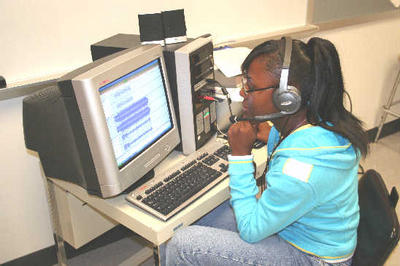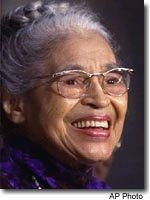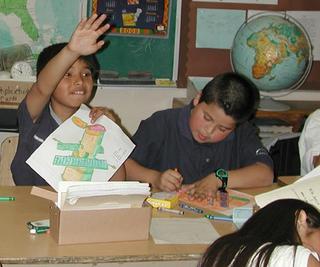 High school integrates new technology into the curriculum
High school integrates new technology into the curriculumThe word
podcasting represents the blending of two other terms and their definitions - Apple's
iPod and
broadcasting. According to Wikipedia, podcasting is a method of publishing files to the Internet, allowing users to subscribe to a feed and receive new files automatically by subscription, usually at no cost. It first became popular in late 2004, used largely for audio files.
According to
CNET News.com and
The Associated Press, Yahoo is expected to launch a podcast service on Monday that offers access to much of the streaming audio on the Web and features user reviews and other information about the programming.
Education represents one of the newer venues taking advantage of podcasting. The Hazelwood School District in Missouri is exploring this relatively new frontier.
Hazelwood East High School student, teacher enter the brave, new world of podcasting
Hazelwood East High School senior Ariel Green (pictured above) is a pioneer. She is the first student at the school to create a podcast, which is a way to publish audio programs via the Internet.
“Think of it as Internet radio,” said her communication skills teacher, Bill Bass. “You have always been able to download a lot of audio files off of the Internet, but a podcast lets you subscribe to a specific audio file.” He added that podcasts can be set to download automatically.
Seated at a computer, Green wears headphones and works diligently in Bass’ classroom while other students work at standard desks or on the room’s other computers.
“It’s something different,” Green said. “When he [Bass] first approached me about it, none of the other students seemed interested or if they were interested, they didn’t have the time to do it. He said it had never been done here before and I have always liked doing new things.”
While a podcast can be any length desired, bandwidth, or lack of it, can be a possible barrier, Bass added. Bandwidth is the amount of data that can be transmitted during a fixed amount of time and is usually expressed in bits or bytes per second (bps) for digital devices and hertz (Hz) for analog devices. He said he would like to keep the school’s podcasts to around 20 minutes long.
“Podcasting just came about in September 2004,” Bass said. “I discovered it this past January. I heard about it and began thinking about it. I’m always looking for ways to include technology in my class. I wanted to communicate to parents about what we do and to let people know about the good things we are doing and podcasting is a good way to do that.”
Bass said podcasting can be made as simple or as complex as one wants. Some of the equipment needed includes an audio recorder, a converter for changing audio files to MP3 files, so the files can be posted on a weblog or a “blog” and an Internet connection.
“I really didn’t know what to think,” Green said as she took a break from making the school’s second podcast. “It has been difficult but I’m getting the hang of it as I go along.” She has been traveling around Hazelwood East, interviewing principal Mark Martin, several of the school’s new teachers as well as gathering information on new programs within the building.
“I want it all to be student-produced,” Bass said. “I will help them do it. I will take care of things but if it’s just me doing the podcasting, I don’t think it means as much.” He made the school’s first podcast, a five-minute piece that came as an outgrowth of one of his creative writing classes, he said. At least one other high school keeps an eye on East’s progress: a teacher in Denver, Colorado will use the podcasts as a model for his school, Bass said.
Green spent time on a recent morning merging her interviews with background music she had selected. “Before I graduate, I hope to cover more events and features and information to parents so they know more about what’s going on here at Hazelwood East.”
So far, Green is the only student at the school working on podcasting. She interviewed the principal, new teachers and learned about new school programs for her podcast, which is designed to keep parents informed about activities at the high school.
To listen to the first Hazelwood East podcast, log on to the Internet and go to
http://spartancast.blogspot.com/. To find out more about podcasting, go to
http://thisweekintech.com/podcastinfo. Click
here for additional information.
Newsweek.com has also written on this topic.
Tags:
Education,
Technology,
Podcasting,
iPod,
Internet,
Communication Arts,
Missouri
 Linking teacher salaries to student achievement
Linking teacher salaries to student achievement





















